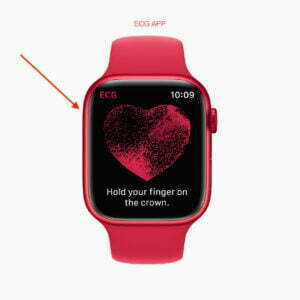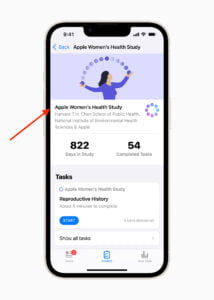Hello friends and family, Leo here. Today lets talk about the latests advancements in Health that Apple Watch is bringing.
There’s no denying that technology has significantly changed our lives. From the way we communicate to the way we work, we’ve seen incredible advancements in recent years. One area where technology has made a substantial impact is in health and wellness.
In particular, the Apple Watch has emerged as a powerful tool in the fields of heart health and women’s health, thanks to its innovative features and capabilities. In this blog post, we’ll explore how Apple Watch is transforming research in these areas and contributing to a better understanding of our overall health.
Don’t miss out on the latest and greatest in the world of iPhone updates! Head over this article to get the scoop on iOS 16.4. Discover all the new features, improvements, and hidden gems that will elevate your iPhone experience like never before. Stay ahead of the curve and read up on this must-know information now!
Curious about how Apple is embracing clean energy for iPhones? Check out here to learn about the exciting ways Apple is integrating sustainable practices into iPhone production. Discover their commitment to renewable energy, innovative manufacturing processes, and eco-friendly design. Get informed and join the conversation on how your favorite tech giant is taking steps towards a greener future!
No more talking, let’s deep dive into Apple advancements in health!
Harnessing the Power of Apple Watch for Heart Health Research\

Revolutionizing Cardiovascular Research with Apple Watch
Researchers have long struggled with limited access to cardiovascular data, which hampers our understanding of heart health. Fortunately, the Apple Watch is changing that. With its built-in heart rate monitor, electrocardiogram (ECG) app, and the irregular rhythm notification feature, the Apple Watch is a powerful tool for monitoring and collecting cardiovascular data.
By providing users with real-time information about their heart health, the Apple Watch is revolutionizing cardiovascular research.
Apple Watch: The Key to Uncovering Invisible Heart Health Information
The Apple Watch has become a valuable tool in visualizing hidden heart health data. With features such as high and low heart notifications, Cardio Fitness, irregular rhythm notifications, the ECG app, and AFib History, Apple Watch helps users gain actionable insights into their health. Researchers, clinicians, and developers have discovered innovative ways to study, track, and treat various conditions since the launch of ResearchKit and CareKit in 2015. The Investigator Support Program was established to help researchers explore new frontiers in health research by providing them with Apple Watch devices.
Heart Rhythm and Cancer Treatment: Research Down Under
Senior pediatric oncologists, Associate professor Rachel Conyers and Dr. Claudia Toro from Melbourne, Australia, are examining the impact of cancer treatment on heart rhythm. They aim to find innovative ways to intervene, drawing inspiration from their patients’ success stories and struggles.
Their research focuses on the consequences of toxicities in cancer treatment, which can lead to potentially life-threatening heart rhythm disturbances like prolonged QT syndrome.
Investigating Wildfire Smoke’s Impact on Firefighters’ Heart Health
Dr. So-Min Cheong, an associate professor at Texas A&M University, is exploring the effects of wildfire smoke on firefighters’ cardiac health. Dr. Cheong and her team will equip firefighters with Apple Watches, monitoring heart rate and rhythm, sleep, blood oxygen, activity data, and more. This groundbreaking study aims to provide personalized health data for more precise health measurements and interventions.
Detecting Atrial Fibrillation Early: A Dutch Research Initiative
At the Amsterdam University Medical Centers, Dr. Sebastiaan Blok and his colleagues are developing a randomized controlled study called HartWacht, aimed at detecting atrial fibrillation (AFib) earlier. They plan to enroll over 300 patients aged 65 and above who meet a risk threshold for AFib.
Half of these participants will wear Apple Watch for at least 12 hours a day. Dr. Blok and his team believe the Apple Watch is an ideal device to integrate into research and healthcare systems.
The Road Ahead: A Bright Future for Heart Health Research
Apple Watch has opened up new possibilities in heart health research. Researchers plan to further explore the use of ECG app for remote patient monitoring and finding predictive biomarkers for heart failure exacerbations. As technology continues to advance, the Apple Watch’s role in shaping the future of heart health research remains promising.
Advancing Women’s Health Through the Apple Women’s Health Study

The Significance of the Apple Women’s Health Study
For too long, women’s health has been under-researched and misunderstood, particularly when it comes to menstrual health. The Apple Women’s Health Study, a collaboration between Apple, the Harvard T.H. Chan School of Public Health, and the National Institute of Environmental Health Sciences, aims to change that. The study uses the Apple Watch and iPhone to collect data on participants’ menstrual cycles, allowing researchers to better understand the factors that influence women’s health.
How the Women’s Health Works
Participants in the Apple Women’s Health Study use the Apple Watch and iPhone to track their menstrual cycles, symptoms, and other health data.
The study is open to women in the United States who are 18 years or older and have an iPhone 6s or later. Participants are asked to complete a short survey every three months, which provides valuable information for researchers.
Key Findings and Implications for Women’s Health
The Apple Women’s Health Study has already led to some fascinating findings. For example, researchers discovered that women with polycystic ovary syndrome (PCOS) were more likely to experience irregular periods, heavy bleeding, and longer cycle durations.
This information is crucial for understanding the underlying factors that contribute to menstrual cycle irregularities and developing targeted treatments for women with PCOS. Additionally, the study found that women who reported high levels of stress were more likely to experience menstrual pain, highlighting the importance of stress management for overall women’s health.
Breaking New Ground in Women’s Health Research
The Apple Women’s Health Study is also breaking new ground in understanding the relationship between menstrual cycles and various health conditions. For instance, the study found that women with a history of depression were more likely to experience premenstrual symptoms. This finding suggests that mental health and menstrual health are closely linked, emphasizing the need for integrated care that addresses both physical and emotional well-being.
The Future of the Apple Women’s Health Study
As the study continues, researchers hope to gain even more insights into women’s health. They plan to explore the connections between menstrual cycles and other health conditions, such as endometriosis and fibroids, as well as the impact of lifestyle factors like sleep, exercise, and nutrition on menstrual health.
By advancing our understanding of these issues, the Apple Women’s Health Study is paving the way for more effective treatments and interventions that can improve the lives of women around the world.
Summary – Apple Watch’s Role in Shaping the Future of Health Research
The Apple Watch has proven itself as more than just a stylish accessory or fitness tracker; it’s a powerful tool that’s transforming health research. By enabling researchers to collect massive amounts of data on heart health and women’s health, the Apple Watch is advancing our understanding of these critical areas and helping to improve the lives of millions of people.
As technology continues to advance, we can expect even more breakthroughs in health research. The Apple Watch is just the beginning, and we’re excited to see what the future holds for wearable technology and its role in shaping our understanding of human health. So, whether you’re using your Apple Watch to monitor your heart rate or track your menstrual cycle, know that you’re contributing to a brighter, healthier future for all.
Fellow Apple Lovers, that’s all. I hope you liked reading this article as much as I enjoyed writing it. If you want to support this blog you can Buy Me a Coffee or say hello on Twitter. I’m available on LinkedIn or send me an e-mail through the contact page.
You can likewise sponsor this blog so I can get my blog free of ad networks.
Thanks for the reading and… That’s all folks.
Image credit: Featured Image






